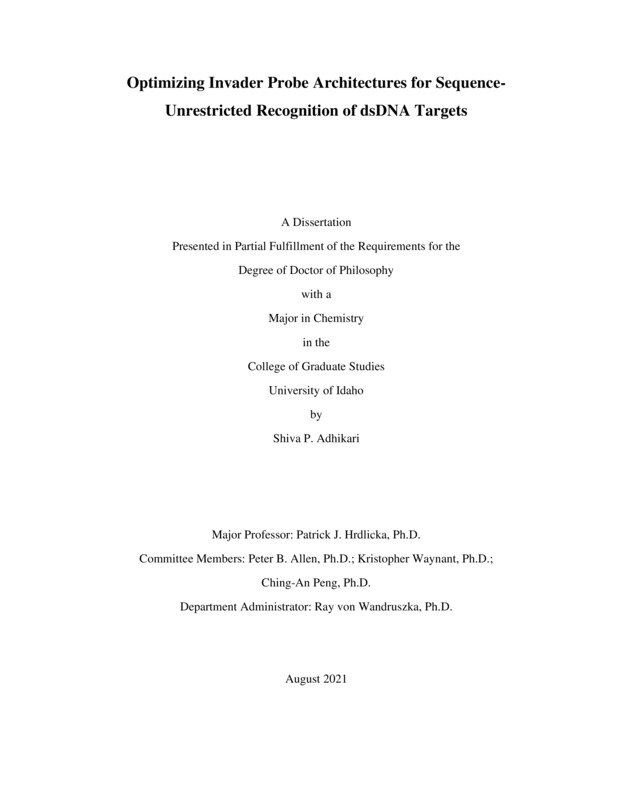Optimizing Invader Probe Architectures for Sequence-Unrestricted Recognition of dsDNA Targets
Adhikari, Shiva P. (2021-08). Optimizing Invader Probe Architectures for Sequence-Unrestricted Recognition of dsDNA Targets. Theses and Dissertations Collection, University of Idaho Library Digital Collections. https://www.lib.uidaho.edu/digital/etd/items/adhikari_idaho_0089e_12195.html
- Title:
- Optimizing Invader Probe Architectures for Sequence-Unrestricted Recognition of dsDNA Targets
- Author:
- Adhikari, Shiva P
- Date:
- 2021-08
- Embargo Remove Date:
- 2023-09-01
- Keywords:
- DNA gene-targeting Intercalator Invader probe Nucleic acid oligonucleotide
- Program:
- Chemistry
- Subject Category:
- Chemistry
- Abstract:
-
Oligonucleotides capable of sequence-specific recognition of double-stranded (ds) DNA have tremendous potential as tools in the areas of diagnostics, genome editing, and molecular therapy. One of the envisioned advantages of gene-targeting modalities is the prospect for lower drug doses since genetic diseases often emanate from a single gene. Conventional DNA-targeting modalities include pyrrole-imidazole polyamides, triplex-forming oligonucleotides (TFOs), peptide nucleic acids (PNAs), and engineered proteins. While proof-of-principle has been demonstrated for these strategies, they exhibit shortcomings, e.g., TFOs require extended polypurine target regions, while PNAs need low ionic strengths for efficient dsDNA-recognition. The emergence of CRISPR/Cas, an RNA-guided protein-based DNA-targeting technique, shows considerable promise albeit being marred by significant off-target and delivery challenges. There is, hence, an unmet need for oligonucleotide-based chemical probes capable of recognizing mixed-sequence dsDNA at physiological conditions. Towards this end, our laboratory has designed so-called Invader probes, i.e., short DNA duplexes modified with one or more +1 interstrand zipper arrangements of intercalator-modified nucleotides such as 2′-O-(pyren-1-yl)methyl-RNA monomers. These monomer arrangements result in a destabilized and energetically activated duplex, where each strand exhibits very high affinity towards complementary DNA regions since recognition results in highly favorable stacking interactions between intercalators and flanking base pairs. Invader probes enable recognition of mixed-sequence dsDNA regions with excellent specificity at physiological conditions. The double-stranded probes must dissociate easily for this approach to be effective. This renders GC-rich and long target regions challenging since the probes are high-melting. We aim to develop optimized Invader probe architectures that display efficient recognition of challenging regions. Specifically, the work in this dissertation describes three novel architectures; i) spermine-bulged Invader probes where non-nucleotidic spermine bulges are introduced in Invader probes to destabilize the duplex, ii) toehold Invader probes in which the probes are trimmed to shorten the double-stranded region of the probe to expose single-stranded overhangs that can be additionally modified with affinity-enhancing modifications, and iii) nicked Invader probes in which nicks are introduced in longer probes to facilitate dissociation. The ability of probes to recognize mixed-sequence dsDNA was evaluated using an electrophoretic mobility shift assay in which either a dsDNA or a hairpin was used as a model target comprising regions complementary to the probes. Dose-response profiles were determined to compare the efficiency between different probes. Lastly, the probes were evaluated for their ability to recognize the corresponding DYZ-1 target region in the context of fluorescence in situ hybridization (FISH) assays. Overall, this dissertation work advances DNA-targeting knowledge and will aid in the selection of the best probe architecture to improve DNA-targeting for future applications in molecular biology, biotechnology, and biomedicine.
- Description:
- doctoral, Ph.D., Chemistry -- University of Idaho - College of Graduate Studies, 2021-08
- Major Professor:
- Hrdlicka, Patrick J
- Committee:
- Waynant, Kristopher; Allen, Peter; Peng, Ching-An
- Defense Date:
- 2021-08
- Identifier:
- Adhikari_idaho_0089E_12195
- Type:
- Text
- Format Original:
- Format:
- application/pdf
- Rights:
- In Copyright - Educational Use Permitted. For more information, please contact University of Idaho Library Special Collections and Archives Department at libspec@uidaho.edu.
- Standardized Rights:
- http://rightsstatements.org/vocab/InC-EDU/1.0/

